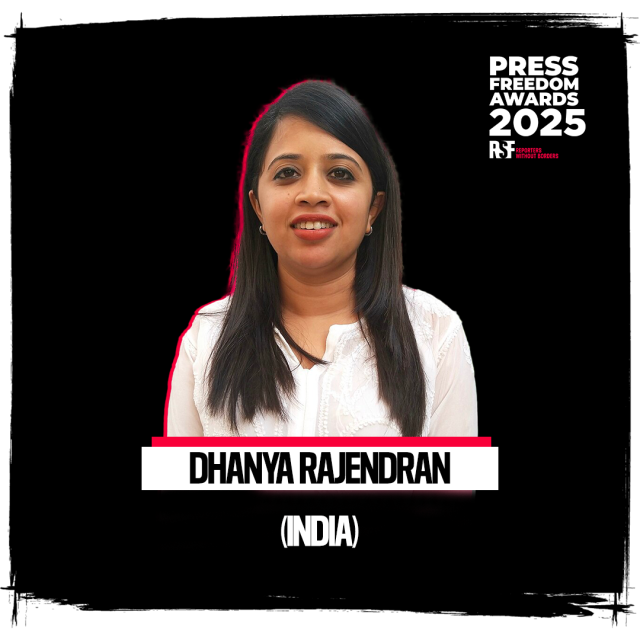In a year that global press freedom continues to be under existential challenges, Indian journalist Dhanya Rajendran — co-founder and Editor-in-Chief at The News Minute — has been shortlisted for the Impact Prize at the 2025 Reporters Without Borders (RSF) Press Freedom Awards, one of the world’s most acclaimed recognitions of independent journalism.

Rajendran is one of a selected group of 29 journalists, photojournalists and media organisations shortlisted from 18 nations in five categories, who are awarded for their remarkable efforts to push press freedom forward in the face of increasing threats from censorship, surveillance, state harassment and online hate. The RSF ceremony — in its thirty-third year — acquires historic importance in 2025, when it falls on the 40th anniversary of the Paris-based organisation. It will take place not as a traditional awards evening, but as part of the inaugural RSF Festival, an open celebration of free expression and access to trustworthy information, at the Gaîté Lyrique arts centre on 15 November in Paris.
The RSF Impact Prize recognises journalists who have measurably shifted the needle — driven policy change, legislative reform, public accountability or the media landscape — with their reporting. Rajendran’s naming is an acknowledgement not just of her aggressive coverage of gender, social injustice and political power, but also for her role in creating one of India’s most trusted online newsrooms at a time when confidence in media is disintegrating and independent journalism is constantly under economic and political threat.
Established in 2014, The News Minute has become a leader in South India-focused explanatory journalism, reporting on the region with the kind of sophistication that national TV channels and regional media often overlook. Former television journalist Rajendran led TNM into the public sphere with its firm gender-justice perspective, calibrated crisis reporting and its unwillingness to compromise critical reporting for access or power. She has endured vicious targeted harassment — particularly online — for challenging political trolling environments and abusive celebrity fan culture, and for advocating the right of small independent newsrooms to operate outside corporate media conglomerates.
This year’s RSF Festival transcends a formal award ceremony. Spanning several sessions, it will feature films, debates, workshops, performances and exhibitions and provide a cultural venue for citizens, journalists, students and activists to grapple with what RSF terms the worldwide “information war” — a phrase capturing an era of disinformation, AI-generated propaganda and state-driven opacity in democratic and non-democratic environments alike. RSF Editorial Director Anne Bocandé, who will present the ceremony, has spoken of the shortlisted nominees as “information heroes”, a description that highlights how journalism — once simply defined as a pillar of democracy — is increasingly being regarded as an act of defiance.
The shortlist consists of 15 reporters, nine news organisations and five photographers from as politically charged regions as the Sahel and Latin America, as digitally monitored as Eastern Europe and Southeast Asia, and as democratically destabilised as the United States and India. The five main award categories this year are the Courage Prize, Impact Prize, Independence Prize, Mohamed Maïga Prize for African Investigative Journalism, and the Lucas Dolega-SAIF Photo Prize. The winners will be disclosed publicly on the night of 15 November 2025 in Paris.
For Indian reporting, Rajendran’s nomination comes at a time of intensely polarised public debate and growing danger to journalists reporting on accountability journalism. It puts her in the tradition of earlier Indian RSF winners whose reporting has pursued truth in the face of pressure — an unusual place and an unusual reminder that international recognition still awaits those who push for transparency in systems that are increasingly opposed to it.
If she succeeds, Rajendran will join an extremely short list of Indian journalists to receive the RSF Impact award — but even the nomination itself heralds something greater: global recognition that press freedom’s future is less and less about venerable newsrooms and more and more about militantly independent, digitally born editors like her who keep making waves in a growing climate of fear.
Discover more from Creative Brands
Subscribe to get the latest posts sent to your email.





